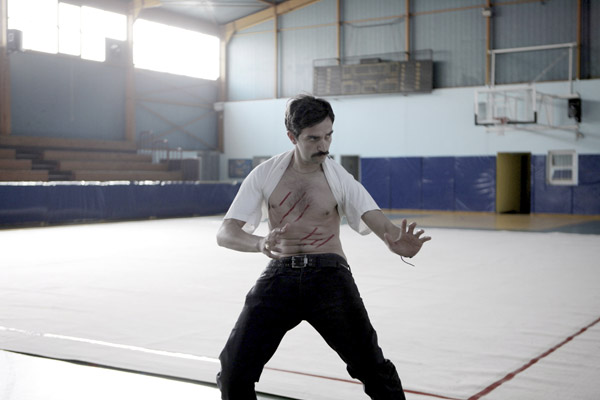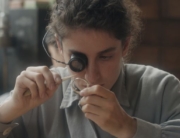
Johnny Vekris as Coach (Kino Lorber)
Alps, the third feature by Greek filmmaker Yorgos Lanthimos, is very much in the vein of his first two films, Kinetta (2005) and Dogtooth (2009). These are darkly absurdist, almost mannerist depictions of people who live in cult-like devotion to self-created rituals and traditions. In Kinetta, a group of people perform elaborate reenactments of murder scenes in a seaside resort town. Dogtooth concerns a family home that is its own sealed-off country, lorded over by a patriarch who keeps a tight control over his brood, even designing an alternate vocabulary in which common words are given very different meanings from their dictionary definitions.
Alps follows a tiny organization of four people (named after the titular mountain range) who hire themselves out to stand in for the deceased, acting out scenes with the dead’s family members. The ostensible reason for this is therapeutic; to assist the families in dealing with the grief over the loss of their loved ones, but it soon becomes clear that the group have their own deep psychological issues, which never are really made clear. The leader, a paramedic (Aris Servetalis) who names himself Mont Blanc, rigidly commands the other three: a nurse (Aggeliki Papoulia), a female gymnast (Ariane Labed), and her coach (Johnny Vekris). Or so he thinks. Cracks soon appear in this system, and one member of the group goes rogue and wreaks all sorts of havoc.
Lanthimos doles out the information about this group very slowly, and the initial scenes present us a puzzle with pieces missing. In fact, it takes quite a while for us to understand that these characters are, in fact, part of a unit, since we are introduced to them in separate, seemingly unrelated scenes. It isn’t until the four gather in the cavernous, rather forbidding space of a gymnasium and choose names for themselves Reservoir Dogs-style that we realize their connection.
Much of what the group carries out consists of a bizarre form of performance art. Each plays a role of a deceased person, armed with such information as the dead’s favorite sports activities and movie stars. They memorize dialog that the deceased used to say, but they say the lines robotically, giving their playacting a very unnerving quality. As the film progresses, the line between “real life” and “performance” becomes increasingly blurred, which leads to a violent confrontation near the film’s conclusion, exploding the leader’s meticulous control.
All this is largely conveyed through the eyes of the nurse, who initially seems to be the member of the Alps who most enthusiastically embraces the tenets of the group, but her extreme fervor eventually threatens its very existence. The nurse is intensely, and wonderfully, portrayed by Papoulia, who also played the eldest daughter in Dogtooth. Her character’s trajectory provides an emotional anchor to a film that sometimes veers dangerously into the realm of coldly intellectual formalism.
Alps is as visually compelling as it is deeply strange. Lanthimos and cinematographer Christos Voudouris provide striking compositions which maintain an unnervingly off-kilter tone. Characters are often cut off in the frame or isolated in the widescreen’s shallow focus in which the background dissolves into blobs of color and light resembling abstract paintings.
However, as impressive as Alps often is, there is a sense that its similarity to Lanthimos’ previous features indicates that his films are becoming formulaic—both Alps and Dogtooth were co-written by Lanthimos and Efthimis Filippou. Also, the fact that the Alps members, as opposed to the characters in his other films, are less hermetically isolated and interact more with the outside world diffuses the impact and intensity of how this sub-society operates. The potential provocation posed by these characters’ behavior is somewhat defanged and diluted by the increasing sense of the familiar. Still, Lanthimos undeniably brings a unique, sui generis vision to his fascinating worlds.
















Leave A Comment